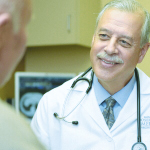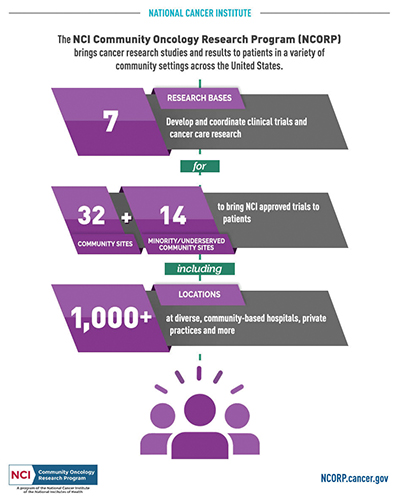By LISA EISENHAUER
Over the last 25 years, Saint Joseph Mercy Health System has developed a cancer research program that its creators say nonacademic hospitals across the country could use as a model to give their patients access to the latest cancer trials and experimental treatments.
The system's St. Joseph Mercy Ann Arbor hospital leads the Michigan Cancer Research Consortium. By tapping a combination of public and private resources, the hospital and its partner institutions in the consortium have helped thousands of patients enroll in cutting-edge research programs without leaving the communities where they live.
Among the trials the hospitals in the consortium take part in are those that test the latest in immunotherapy and use genomic profiling to provide personalized treatments.

Stella
"Places like St. Joe's that are committed to this kind of research, help develop the breakthroughs for tomorrow, while offering hope for today, which is a very important thing for these patients," says Dr. Phil Stella, medical director of oncology at St. Joe's (the system's nickname) and the consortium's lead investigator.
Partnering with other hospitals
The model began taking shape in the mid-1990s when St. Joseph Mercy Ann Arbor became the lead hospital in the newly formed Michigan Cancer Research Consortium, part of the National Cancer Institute's Community Oncology Research Program. The NCI Community Oncology Research Program is a national network that brings cancer clinical trials and care delivery studies to people in their own communities. It comprises seven research bases, or research hubs, and 46 community sites, one of which is the Michigan Cancer Research Consortium. In addition to Michigan, that consortium has participating cancer centers in Pennsylvania and Florida.

LaVasseur
This summer, the NCI awarded the Michigan consortium a six-year, $19.3 million grant to continue its work. Over its history, the consortium has enrolled about 10,000 patients in Phase 1B, Phase 2 and Phase 3 studies, which can include as few as 10 and as many as tens of thousands of patients nationally and are designed to help determine the best ways to prevent, detect, diagnose and treat cancer, says Beth LaVasseur, executive director of oncology and research for Saint Joseph Mercy Health.
The NCI funds cover the cost of the infrastructure necessary to run a large clinical trial operation. The funds also pay for the Michigan consortium's staff, now at 34. The staff helps the hospitals to reach out to patients, submit all the data, manage biospecimens and see that regulatory requirements are met.
Fulfilling Catholic mission
The latest grant from the NCI is almost twice what the consortium got five years ago. The increase reflects the federal agency's confidence in the work being spearheaded by St. Joe's, LaVasseur and Stella say. It also means the consortium can offer patients access to even more
trials and potentially life-extending or lifesaving treatments.
"This is a very important thing from a Catholic perspective, having access to these trials no matter what socioeconomic demographic you are in," Stella says.
In addition to the publicly funded research, the consortium also takes part in industry-sponsored trials to assess the efficacy and safety of new and not yet federally approved cancer drugs and treatments.
LaVasseur says the industry trials enroll about as many people as the ones linked to the NCI. In each of the last four years, the Michigan consortium enrolled a total of about 1,200 patients in publicly or privately funded studies.
"At any given time, we usually have about 100 studies open to accrual, meaning patients could enter those studies, and we have about 300 studies that we are following patients on that are active but not newly recruiting," LaVasseur says.
Enticement for doctors
Offering access to experimental treatments is not only an opportunity for patients, LaVasseur and Stella say, it is a way the community hospitals in the consortium can lure doctors who want to take part in clinical research.
Among the trials the consortium is involved in is the Targeted Agent and Profiling Utilization Registry Study to determine if specific molecularly targeted cancer drugs are effective beyond the uses approved by the Food and Drug Administration. The national study is of patients with advanced cancer who have not responded to or are no longer responding to standard treatment. Its primary sponsor is the American Society of Clinical Oncology.
Stella points to the TAPUR Study as one of the most advanced being done in cancer treatment. The drugs being tested are specifically matched to the genetic mutations found in a patient's tumor. Michigan consortium members have enrolled over 250 patients in the TAPUR Study, which launched in 2016.
St. Joe's participation is a point of pride for Stella. "Here we are representing a community cancer center and we are one of the highest accruers year after year because of our commitment to this very important area of molecular-targeting and personalized medicine," he says.
Improving patient outcomes
LaVasseur and Stella say the advances that have been made in cancer treatments in recent decades are evident in the survival rate and quality of life of patients. According to the American Cancer Society, the overall age-adjusted cancer death rate rose during most of the 20th century, peaking in 1991 at 215 cancer deaths per 100,000 people. As of 2016, the rate had dropped to 156 per 100,000 (a decline of 27 percent) because of reductions in smoking, as well as improvements in early detection and treatment. This decline translates into more than
2.6 million fewer cancer deaths from 1991 to 2016.
LaVasseur says, "Through science we're getting closer and closer to understanding which one of these patients are going to be helped by which treatments because of the personalized medicine."
Stella and LaVasseur hope to see more hospitals follow St. Joe's lead into cancer research that offers more patients access to clinical trials and the latest treatments.
"We have developed a method by grants and pharmaceutical trials that really doesn't require a lot more investment of dollars and resources from a hospital," says Stella, who was honored this year by the NCI as its oncology community investigator of the year.
He is heartened by the advances he's seen in his 30 years in oncology practice and research, and by the patients who are alive today because of those breakthroughs. "That's why we continue to do this research and why we're committed to it."
Lung cancer patient survives, thrives as a result of clinical drug trial
David Husak sees the fact that he is not only still around but living a comfortable life almost four years after being diagnosed with stage 4 metastatic lung cancer as "miraculous."

David Husak, 84, spends time with Marissa, the youngest of his nine grandchildren. He credits a clinical drug trial he has been part of for more than three years through the Saint Joseph Mercy Health System with keeping his lung cancer from progressing.
The 84-year-old retired chemical engineer and plant manager is one of several patients Saint Joseph Mercy Health System is featuring in a promotional campaign about its cancer care. Part of that care is made possible through the health system's participation in the National Cancer Institute's Community Oncology Research Program and some of it through trials of experimental cancer drug treatments it offers through research partnerships with pharmaceutical companies.
Husak credits his good fortune to a drug trial he was encouraged to enter just after he got the grim news about his condition at St. Joseph Mercy Ann Arbor hospital in Ypsilanti, Mich., in April 2016.
Husak smoked cigarettes as a young man and then a pipe from the time he was about 30. Nevertheless, when what he thought was a broken collarbone pushing through his chest turned out to in fact be cancer that had metastasized to his sternum, he was shocked. While he doesn't know if smoking caused his condition, he says, "it certainly did not improve my chances of not getting cancer."
When he was told he'd be a good candidate for a clinical trial of the drug atezolizumab (sold under the brand name Tecentriq), Husak had no hesitation about enrolling. Since mid-2016, he has gone to St. Joseph Mercy Brighton health center, just a few miles from his home in Pinckney, Mich., every three weeks for blood testing, a checkup by his oncologist and an infusion of atezolizumab. The findings from his blood tests, checkups and other testing related to his cancer care are shared with the drug's manufacturer, Genentech.
Husak says he's happy to be a test case for a drug provided to him without charge and administered close to his home. He credits the drug therapy and the "world-class care" he's gotten through Saint Joseph Mercy Health for keeping his cancer in check and prolonging his life. "Aside from a little bit of shortness of breath, I feel good all the time," he says.
He readily shares his success story about his clinical trial, including just recently with a woman newly diagnosed with lung cancer whom he met while both were waiting for CT scans. "It was like a weight lifted from her shoulders," he says. "I gave her some hope."
The trial he is in is likely to end before long, Husak says, but he's not worried because the drug has been federally approved and his medical insurer says it will cover the drug's cost.
"I still have my cancer, it's still there. It will never go away, it will never be in remission," Husak says. "But this drug is controlling it to where it's not doing anything but sitting there."
— LISA EISENHAUER
Michigan Cancer Research Consortium members
- Saint Joseph Mercy Health System hospitals, part of the Trinity Health Michigan Region:
- St. Joseph Mercy Ann Arbor, Ypsilanti, Mich.
- St. Joseph Mercy Chelsea, Chelsea, Mich.
- St. Joseph Mercy Livingston, Howell, Mich.
- St. Joseph Mercy Oakland, Pontiac, Mich.
- St. Mary Mercy Livonia, Livonia, Mich.
- Holy Cross Hospital, Fort Lauderdale, Fla., a Trinity Health hospital
- Sparrow Health System, Lansing, Mich.
- Ascension Macomb-Oakland Hospital Warren, Warren, Mich.
- Ascension St. John Hospital, Detroit
- Ascension St. Mary's Hospital, Saginaw, Mich.
- Genesys Hurley Cancer Institute, Flint, Mich.
- The Lehigh Valley Health Network, Allentown, Pa.
